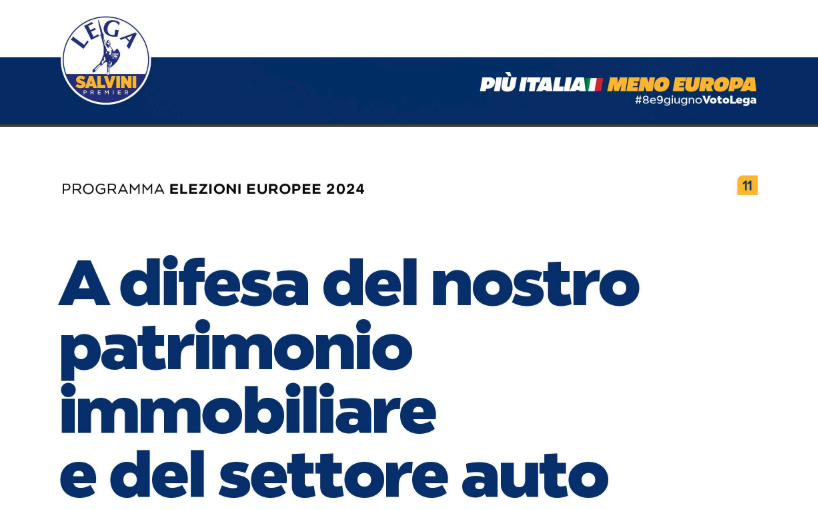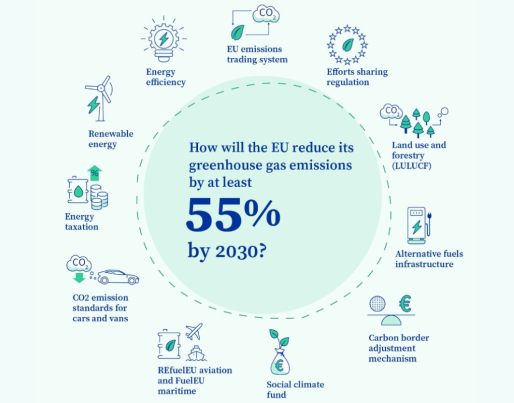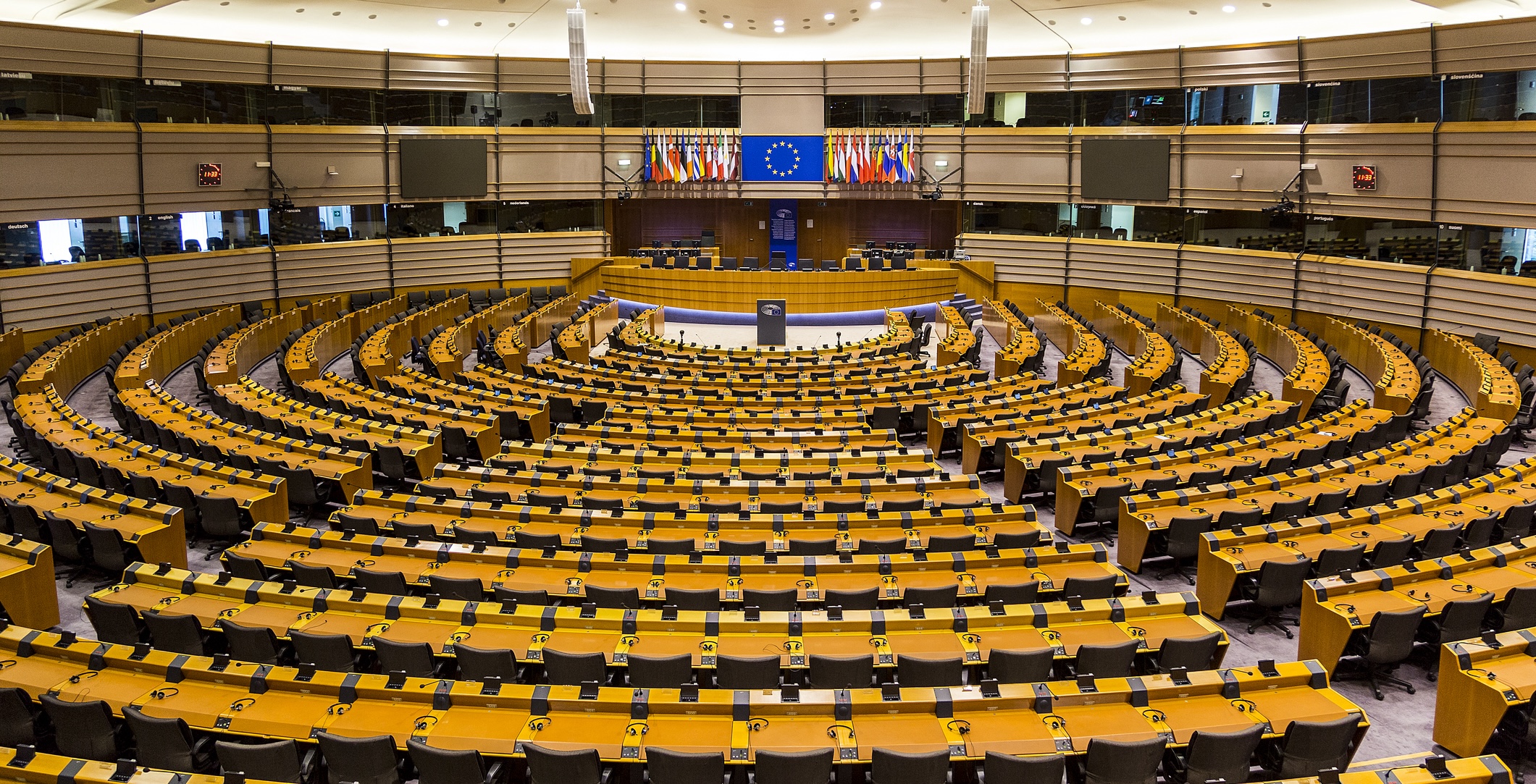“Europe was born to guarantee peace and well-being And work, not to impose electric cars and green houses. » This sentence was pronounced by Minister Matteo Salvini, who recently spoke on a Radio Cusano Campus program. But if we look closely, the League secretary is not the only Italian party leader to attack the two symbolic measures of the European green agenda. The cessation of the sale of new polluting cars from 2035 and the revision of objectives on the energy performance of buildings are undoubtedly two of the most contested European legislative issues in Italy. Both measures were adopted without the favorable vote of the government in Rome. As the European elections approach, some parties have put on paper their desire to repeal, or at least revise, the two laws. But how real is the possibility that the next European Parliament will actually review the Green Homes Directive and the Cars Regulation?
The June vote
The short answer is that it depends on the outcome of the election. Most of the Green Deal files were approved thanks to a fairly large majority, which includes the center-right EPP, the center-left S&D, the liberal Renew and (only in some cases) the Greens. The latest projections from Europe Elects seem to indicate that the composition of the next European Parliament is likely to follow roughly the same balance of power as we have seen over the past five years. The only real difference is the growth of right-wing political groups – the conservative ECR (of which Fratelli d'Italia is a part) and the extremists of I&D (of which the Lega is a part) – at the cost of a loss of consensus among the Greens. If theexploit of the European right exceeded expectations, the center of gravity of the European Chamber could shift to the right, thus changing the direction of the environmental and climate policies of the Green Deal which marked the five years of the European Commission led by Ursula. von der Leyen more likely.
European programs and Italian programs
Forza Italy
However, there is another factor to consider. Italians' perception of the Green Homes Directive and automobile regulations is not the same as that of citizens of other European Union countries. To see this, it is enough to compare the electoral programs of the Italian parties and those of the European political families of which they are part. Forza Italia's programmatic document speaks, for example, of a “revision of the directive on green housing” and the need to protect the automobile sector from “ideological madness supported by the left”. Yet both measures were also adopted with the favorable votes of some MEPs from the centre-right EPP, of which Forza Italia is one. Unlike the programmatic document of Forza Italia, the program of the European People's Party does not mention once the directive on green housing, while on cars it simply says that “there is a need for more technology, not more 'prohibitions'.

Action
A similar short-circuit can also be seen in the action programme, which includes the demand to “make the Green Homes Directive more flexible”. Carlo Calenda himself expressed some doubts about certain provisions of the European green agenda during an event organized by Confcommercio: “The Green Deal as it is does not work. If you respect sustainability, you don't write nonsense,” said the Action leader. But if you look closely, the regulation banning polluting cars from 2035 sees Dutch MEP Jan Huitema Renew, as rapporteur in the European Parliament, the same political family of which Action is part and which in its program does not include any reference to the need to revise the regulation on cars or the directive on houses.
League and Brothers of Italy
As for the other Italian parties, the Lega and the Fratelli d'Italia are the political forces which most vigorously criticize the two files of the Green Deal, but unlike Action and Forza Italia, their position fits perfectly into that of the politics of reference from their family. In its program, the party led by Matteo Salvini calls for “cancelling the green houses directive” so as not to “sacrifice our real estate assets on the altar of energy efficiency”. Concerning automobiles, on the other hand, the League asks to “safeguard the future of the internal combustion engine by lifting its ban from 2035”. Fratelli d'Italia has not yet published its program for the European elections, but – like the League – voted against both measures in the European Parliament. “As President Meloni recalled, the center-right will continue to oppose both the European directive on energy efficiency in housing, which is only a hidden asset, and the ban on gasoline and diesel cars by 2035,” he commented in recent weeks Tommaso Foti, head of the Brothers of Italy group in the Chamber.

Pd, M5 and Avs
Supporters of the Green Homes Directive and the ban on polluting cars include the Democratic Party, the 5 Star Movement and the Green Left Alliance, which supported both measures in the European Parliament. Elly Schlein's Democratic Party does not have its own program for the elections, but the manifesto of the Party of European Socialists – of which the Democratic Party is a part – never explicitly mentions the two issues. The general line, in any case, is quite clear: “implement a Green Deal with a red heart, based on the alliance between social and ecological policies”. The 5 Star Movement also defends the European green agenda, which in its program welcomes the approval of the Green Homes Directive and defines the transition to electric mobility as “irreversible”. The Greens-Left Alliance speaks of the need to “defend and strengthen the Green Deal” against attacks from “conservative political forces”. Concerning the efficiency of buildings, the Avs program provides for the creation of a “European Fund for environmental and social investments of at least 2,000 billion euros”.
Commitment until 2030
The Green Homes Directive and the Car Regulation have been definitively approved. This means that only the new European Commission could request a review of the two files. “The composition of the European Parliament”, specifies a Open sources from the European Chamber, “has a clear impact on the content of the adopted legislation”. In other words, if political forces critical of the Green Deal win in the June elections, it cannot be ruled out that both files could be modified. In any case, underlines the European Parliament, the two measures are part of the Suitable for 55the package of laws by which the EU has committed to reducing its climate change emissions by 55% by 2030. This means that if the level of ambition on houses and cars is reduced, commitments should be strengthened “in other sectors, so that the EU can still achieve the set objectives”.

Recognition periods
Then there's another thing to keep in mind. The final versions of the Green Homes Directive and the Cars Regulation provide for a sort of moment of recognition to verify the real possibility of achieving the set targets. In the case of the Directive on Energy Efficiency in Buildings, the European Commission is responsible for revising the provision in 2028, in light of the progress made so far by the different Member States. The same thing will also happen when it comes to car regulations. In this case, the European Commission is responsible for preparing a report every two years, starting in 2025, on the progress of the automotive sector in reducing emissions.
The crux of e-fuels
The automobile regulation is the legislative file on which the next European Parliament is most likely to intervene to introduce exemptions or modifications. Already last year, the European Commission announced its intention to present a proposal to exclude from the 2035 ban all motor vehicles using 100% e-fuels, that is to say synthetic or biological fuels. This is an exemption strongly requested by the Italian government, but contested by various environmental associations, convinced that the fuels in question are not truly sustainable. In the coming months, the European executive will propose excluding 100% motorized vehicles e-fuels of the ban which will come into force in 2035. If this proposal were to be rejected, specify European Parliament sources, “the Commission has declared that it would propose a revision of the entire regulation” on car emissions.
On the cover: The European Parliament in Strasbourg (Dreamstime/Ivan Katsarov)

